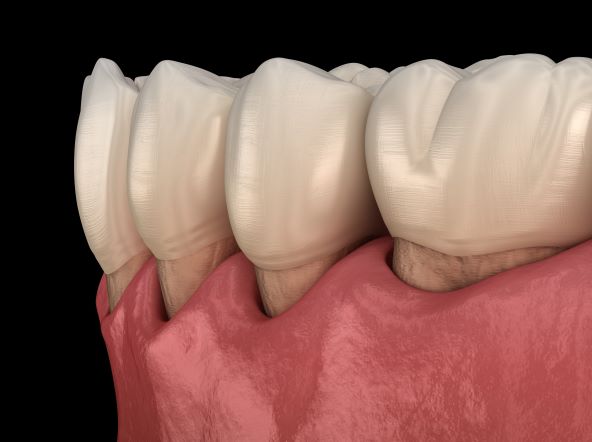
When patients notice receding gumlines, it’s natural to be concerned about their oral health—and for a good reason. Receding gums causes patients to become more susceptible to health issues like sensitivity, tooth decay, gum disease, and tooth loss.
If you’re alarmed by receding gumlines, continue reading and schedule an appointment at Metropolitan Dental Care. Our top dentists in Denver, CO, can tell you why you’re experiencing this oral health issue and how to address it.
Why do gums recede?
Although you might notice receding gumlines for a number of reasons, here are a few:
Aggressive Toothbrushing
Even though they are often overlooked, gums are composed of delicate tissue and must be protected. Whether you brush too hard or use a toothbrush with bristles that are anything but soft, your gums pay the price.
Insufficient Dental Care
In addition to cleaning between teeth once a day, the American Dental Association (ADA) recommends brushing teeth with a soft-bristled toothbrush and fluoride toothpaste for two minutes twice daily. Aside from keeping your breath fresh, one of the most important reasons to practice this daily ritual is to keep plaque and tartar away from the gumline.
Suppose you practice poor oral hygiene. In that case, the plaque (a natural biofilm) on your teeth and along your gum line can calcify and transform into tartar. You might notice deepening periodontal pockets at this point, and only a dental health professional can remove the hardened tartar on and between your teeth.
Bruxism
Excessively grinding or clenching your teeth puts abnormal pressure on your teeth and gums. Consequently, your teeth might appear longer as your gums recede.
Misalignment
If you believe that your teeth are only impacted by misalignment, guess again. Crowded and crooked teeth are more challenging to keep free of tartar and plaque, increasing your risk for tooth decay and gum disease.
Gum Disease
Chronic inflammatory periodontal (gum) disease is one of the top reasons you might notice gum tissue destruction. Initially, gum disease can feel painless and might go unnoticed. However, patients can anticipate significant tissue damage (and even tooth loss) if ignored.
What are some professional treatments for receding gumlines?
Gum recession is a gradual occurrence. If you’re suffering from receding gumlines, it’s essential to understand that your gums won’t go back to normal on their own. Plus, gum recession can lead to more severe consequences if not addressed early via regular dental visits.
As a part of a routine checkup, your dentist measures the enamel. This custom aims to gauge how much of your gingival tissue has migrated over time. If receding gumlines are an issue, your dentist might suggest the following treatments:
Scaling and Root Planing
If your dentist notices receding gumlines, they might suggest scaling and root planing as the first line of defense. During this specialized deep dental cleaning, your dental team member removes any existing plaque and tartar from your teeth and below the gumline. Over time, your gums should heal and tighten around the tooth again.
Gum Grafting and Surgery
As gum disease advances, gums worsen. If this is the case, your dentist might suggest gum grafting or surgery to repair receding gumlines.
Prioritize Your Periodontal Health with Metropolitan Dental Care in Denver
We’re typically instructed to take care of our teeth. Still, gums play an equally important role in oral health. Without proper periodontal care, your smile will suffer. Explore your receding gumline care options at Metropolitan Dental Care by calling 303-534-2626 or messaging us online.

